新概念英语第一册 Lesson55-56 What do they usually do
- 格式:ppt
- 大小:8.60 MB
- 文档页数:42
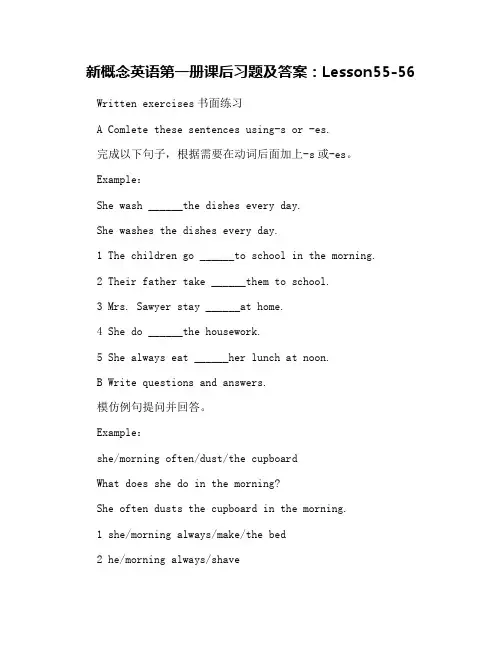
新概念英语第一册课后习题及答案:Lesson55-56 Written exercises书面练习A Comlete these sentences using-s or -es.完成以下句子,根据需要在动词后面加上-s或-es。
Example:She wash ______the dishes every day.She washes the dishes every day.1 The children go ______to school in the morning.2 Their father take ______them to school.3 Mrs. Sawyer stay ______at home.4 She do ______the housework.5 She always eat ______her lunch at noon.B Write questions and answers.模仿例句提问并回答。
Example:she/morning often/dust/the cupboardWhat does she do in the morning?She often dusts the cupboard in the morning.1 she/morning always/make/the bed2 he/morning always/shave3 they/evening sometimes/listen to/the stereo4 he/every day always/clean/the blackboard5 they/night always/go/to bed early6 she/every day usually/wash/the/dishes7 they/afternoon usually/type/some letters8 it/every day usually/drink/some milk9 they/evening sometimes/watch/television10 she/noon always/eat/her lunch11 he/evening often/read/his newspaper答案:Lesson 56A1 The children go to school in the morning.2 Their father takes them to school.3 Mrs. Sawyer stays at home.4 She does the housework.5 She always eats her lunch at noon.B1 What does she do in the morning? She always makes the bed in the morning.2 What does he do in the morning? He always shaves in the morning.3 What do they do in the evening? They sometimes listen to the stereo in the evening.4 What does he do every day? He always cleans the blackboard every day.5 What do they do at night? They always go to bed early at night.6 What does she do every day? She usually washes the dishes every day.7 What do they do in the afternoon? They usually type some letters in the afternoon.8 What does it do every day? It usually drinks some milk every day.9 What do they do in the evening? They sometimes watch television in the evening.10 What does she do at noon? She always eats her lunch at noon.11 What does he do in the evening? He often reads his newspaper in the evening.。

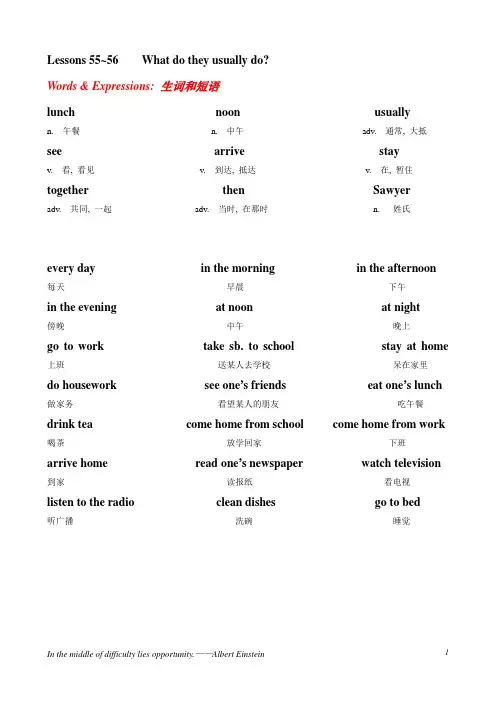
Lessons 55~56 What do they usually do?Words & Expressions: 生词和短语lunch noon usuallyn. 午餐n. 中午adv. 通常, 大抵see arrive stayv. 看, 看见v. 到达, 抵达v. 在, 暂住together then Sawyeradv. 共同, 一起adv. 当时, 在那时n. 姓氏every day in the morning in the afternoon 每天早晨下午in the evening at noon at night傍晚中午晚上go to work take sb. to school stay at home 上班送某人去学校呆在家里do housework see one’s friends eat one’s lunch 做家务看望某人的朋友吃午餐drink tea come home from school come home from work 喝茶放学回家下班arrive home read one’s newspaper watch television 到家读报纸看电视listen to the radio clean dishes go to bed听广播洗碗睡觉Sentence Patterns 重点句型The Sawyers live at 87 King Street. 索耶一家住在金街87号。
In the morning, Mr Sawyer goes to work and the children go to school.早晨,索耶先生去上班,孩子们去上学。
Their father takes them to school. 父亲每天送孩子们去上学。
In the afternoon, she usually sees her friends. 下午,她通常看望朋友。
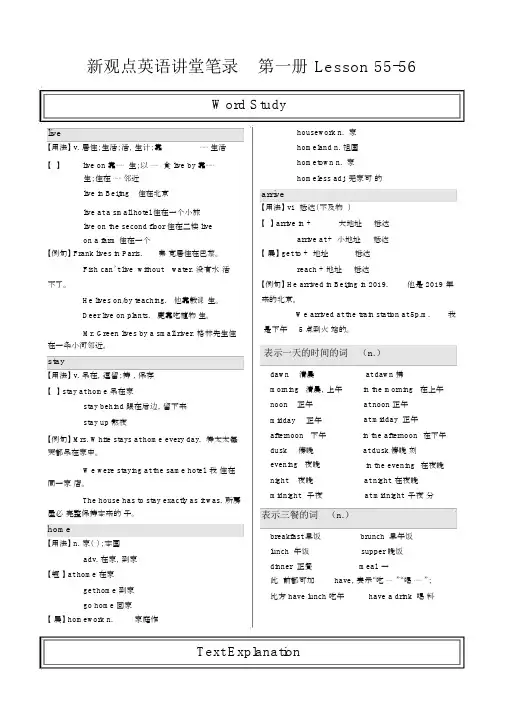
新观点英语讲堂笔录第一册 Lesson 55-56Word Studylive【用法】 v. 居住;生活;活,生计;靠⋯⋯生活【】live on 靠⋯⋯生;以⋯⋯食 live by 靠⋯⋯生;住在⋯⋯邻近live in Beijing住在北京live at a small hotel 住在一个小旅live on the second floor 住在二楼 liveon a farm 住在一个【例句】 Frank lives in Paris.弗克居住在巴黎。
Fish can’t live without water. 没有水活不了。
He lives on/by teaching.他靠教课生。
Deer live on plants.鹿靠吃植物生。
Mr. Green lives by a small river. 格林先生住在一条小河邻近。
stay【用法】 v. 呆在,逗留;持,保存【】 stay at home 呆在家stay behind 跟在后边,留下来stay up 熬夜【例句】 Mrs. White stays at home every day. 特太太每天都呆在家中。
We were staying at the same hotel. 我住在同一家店。
The house has to stay exactly as it was. 所房屋必完整保持本来的子。
home【用法】 n. 家();本国adv. 在家,到家【短】 at home 在家get home 到家go home 回家【展】 homework n.家庭作housework n. 家homeland n. 祖国hometown n. 家homeless adj. 无家可的arrive【用法】 vi. 抵达(不及物)【】 arrive in +大地址抵达arrive at + 小地址抵达【展】 get to + 地址抵达reach + 地址抵达【例句】 He arrived in Beijing in 2019.他是2019年来的北京。

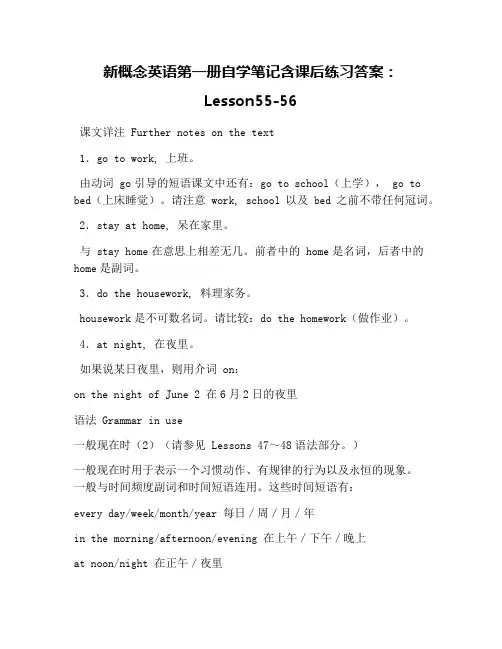
新概念英语第一册自学笔记含课后练习答案:Lesson55-56课文详注 Further notes on the text1.go to work, 上班。
由动词 go引导的短语课文中还有:go to school(上学), go to bed(上床睡觉)。
请注意 work, school以及 bed之前不带任何冠词。
2.stay at home, 呆在家里。
与 stay home在意思上相差无几。
前者中的 home是名词,后者中的home是副词。
3.do the housework, 料理家务。
housework是不可数名词。
请比较:do the homework(做作业)。
4.at night, 在夜里。
如果说某日夜里,则用介词 on:on the night of June 2 在6月2日的夜里语法 Grammar in use一般现在时(2)(请参见 Lessons 47~48语法部分。
)一般现在时用于表示一个习惯动作、有规律的行为以及永恒的现象。
一般与时间频度副词和时间短语连用。
这些时间短语有:every day/week/month/year 每日/周/月/年in the morning/afternoon/evening 在上午/下午/晚上at noon/night 在正午/夜里第3人称单数的谓语动词需加以变位,这可分为几种情况:(1)直接加 -s,如:come----comesarrive----arrives(2)以 -sh, -ch, -o 以及 -s结尾的动词加 -es,如:wash----washesgo----goeswatch----watchesdo----does(3)以辅音加 -y结尾的动词,把 -y改成 -i,再加 -es;而元音加-y结尾的动词,只加 -s即可:hurry----hurriescarry----carriesplay----playsstay----stays词汇学习 Word study1.arrive v.(1)到达;到来:We arrived home early. 我们很早就到家了。
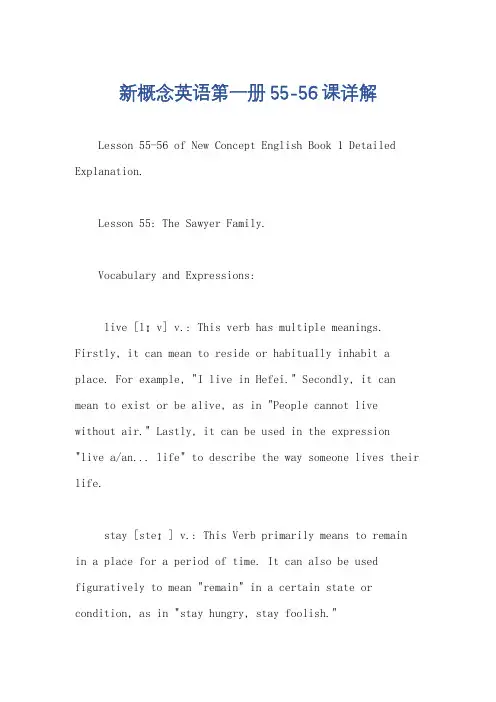
新概念英语第一册55-56课详解Lesson 55-56 of New Concept English Book 1 Detailed Explanation.Lesson 55: The Sawyer Family.Vocabulary and Expressions:live [lɪv] v.: This verb has multiple meanings. Firstly, it can mean to reside or habitually inhabit a place. For example, "I live in Hefei." Secondly, it can mean to exist or be alive, as in "People cannot live without air." Lastly, it can be used in the expression "live a/an... life" to describe the way someone lives their life.stay [steɪ] v.: This Verb primarily means to remain in a place for a period of time. It can also be used figuratively to mean "remain" in a certain state or condition, as in "stay hungry, stay foolish."home [həʊm] n./adv.: As a noun, it refers to the place where one lives. As an adverb, it means "to the place where one lives," as in "go home."housework ['haʊswɜːk] n.: This noun refers to the tasks related to maintaining a household, such as cleaning, cooking, and laundry.lunch [lʌnʃ] n.: This noun refers to the meal eaten in the middle of the day.afternoon [ɑːftə'nuːn] n.: This noun refers to the period of time between noon and evening.Text Explanation:Lesson 55 introduces the Sawyer family and their daily routine. The lesson begins by introducing the family members and their occupations. Mr. Sawyer works in an office, while Mrs. Sawyer stays at home. The children go to school. The lesson then goes on to describe their eveningactivities. Mr. Sawyer usually arrives home from work at about five o'clock, and the family then has their lunch together. In the afternoon, they often have a rest, andthen in the evening, they usually stay at home and watch television.Grammar Points:The use of "-s" or "-es" to form the third-person singular present tense of verbs is reinforced in this lesson. For example, "Mr. Sawyer usually arrives home from work at about five o'clock."The use of prepositions with "live" is also introduced. For example, "Mr. Sawyer lives in a town near London,"where "in" is used with a large place, and "Mrs. Sawyerlives at 87 King Street," where "at" is used with aspecific address.Lesson 56: What Do They Do?Vocabulary and Expressions:together [tə'geðə] adv.: This adverb means "in a group" or "side by side."evening ['iːvnɪŋ] n.: This noun refers to the time of day that comes after afternoon and before night.arrive [ə'raɪv] v.: This Verb means to reach a destination after a journey.night [naɪt] n.: This noun refers to the period of time from sunset to sunrise.Text Explanation:Lesson 56 continues the theme of the Sawyer family's daily life by asking the question, "What do they do?" The lesson provides information about the family's evening activities. Mr. Sawyer usually arrives home from work at about five o'clock, and then the family has their tea together. After tea, they usually sit in the living room and watch television. Sometimes, they go to the cinema orto the theater. On Sundays, they often go for a walk in the park.Grammar Points:The present tense of verbs is reinforced in this lesson, particularly the use of the third-person singular form.The lesson also introduces the use of modal verbs such as "can" and "usually" to express ability and frequency.Conclusion:Lessons 55 and 56 of New Concept English Book 1 focus on the Sawyer family's daily routine and activities. These lessons introduce new vocabulary and expressions related to family life, daily activities, and grammar points such as the use of "-s" or "-es" in the third-person singular present tense and the use of modal verbs. By learning these lessons, students can improve their understanding of family life in English-speaking countries and enhance theirlanguage skills in areas such as vocabulary, grammar, and comprehension.。
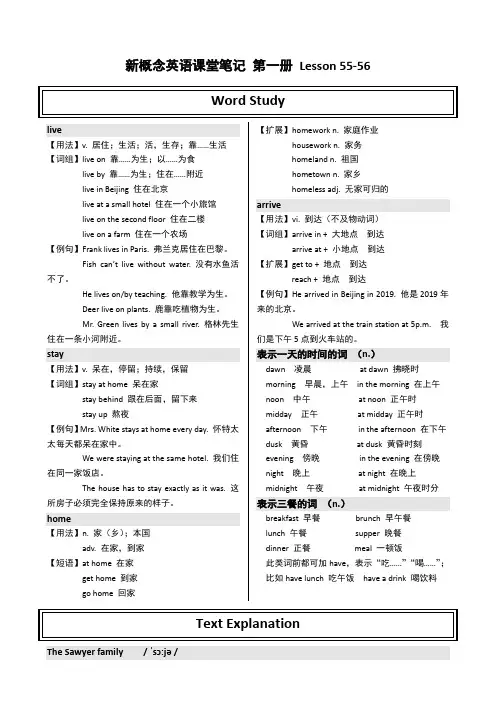
新概念英语课堂笔记第一册Lesson 55-56live【用法】v. 居住;生活;活,生存;靠……生活【词组】live on 靠……为生;以……为食live by 靠……为生;住在……附近live in Beijing 住在北京live at a small hotel 住在一个小旅馆live on the second floor 住在二楼live on a farm 住在一个农场【例句】Frank lives in Paris. 弗兰克居住在巴黎。
Fish can’t live without water. 没有水鱼活不了。
He lives on/by teaching. 他靠教学为生。
Deer live on plants. 鹿靠吃植物为生。
Mr. Green lives by a small river. 格林先生住在一条小河附近。
stay【用法】v. 呆在,停留;持续,保留【词组】stay at home 呆在家stay behind 跟在后面,留下来stay up 熬夜【例句】Mrs. White stays at home every day. 怀特太太每天都呆在家中。
We were staying at the same hotel. 我们住在同一家饭店。
The house has to stay exactly as it was. 这所房子必须完全保持原来的样子。
home【用法】n. 家(乡);本国adv. 在家,到家【短语】at home 在家get home 到家go home 回家【扩展】homework n. 家庭作业housework n. 家务homeland n. 祖国hometown n. 家乡homeless adj. 无家可归的arrive【用法】vi. 到达(不及物动词)【词组】arrive in + 大地点到达arrive at + 小地点到达【扩展】get to + 地点到达reach + 地点到达【例句】He arrived in Beijing in 2019. 他是2019年来的北京。
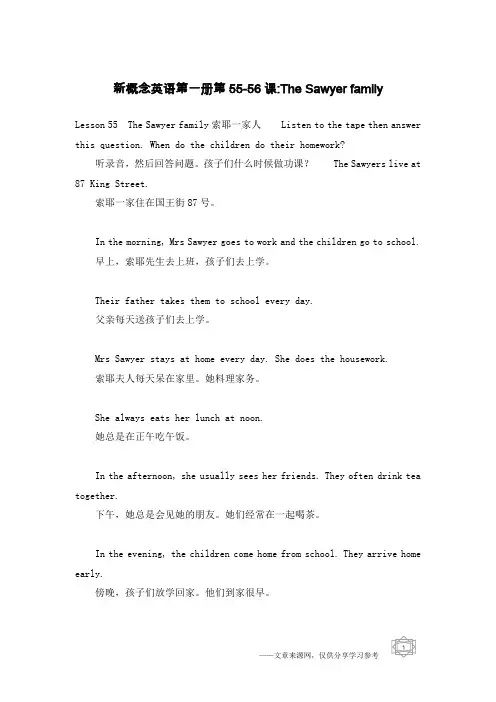
新概念英语第一册第55-56课:The Sawyer familyLesson 55 The Sawyer family索耶一家人Listen to the tape then answer this question. When do the children do their homework?听录音,然后回答问题。
孩子们什么时候做功课?The Sawyers live at 87 King Street.索耶一家住在国王街87号。
In the morning, Mrs Sawyer goes to work and the children go to school.早上,索耶先生去上班,孩子们去上学。
Their father takes them to school every day.父亲每天送孩子们去上学。
Mrs Sawyer stays at home every day. She does the housework.索耶夫人每天呆在家里。
她料理家务。
She always eats her lunch at noon.她总是在正午吃午饭。
In the afternoon, she usually sees her friends. They often drink tea together.下午,她总是会见她的朋友。
她们经常在一起喝茶。
In the evening, the children come home from school. They arrive home early.傍晚,孩子们放学回家。
他们到家很早。
Mr Sawyer comes home from work. He arrives home late.索耶先生下班回家。
他到家很晚。
At night, the children always do their homework. Then they go to bed.晚上,孩子们总是做作业,然后去睡觉。
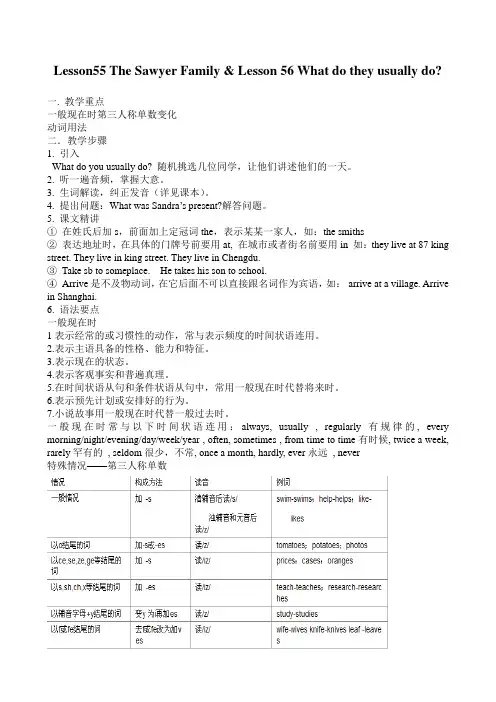
Lesson55 The Sawyer Family & Lesson 56 What do they usually do?一.教学重点一般现在时第三人称单数变化动词用法二.教学步骤1. 引入What do you usually do? 随机挑选几位同学,让他们讲述他们的一天。
2. 听一遍音频,掌握大意。
3. 生词解读,纠正发音(详见课本)。
4. 提出问题:What was Sandra’s present?解答问题。
5. 课文精讲①在姓氏后加s,前面加上定冠词the,表示某某一家人,如:the smiths②表达地址时,在具体的门牌号前要用at, 在城市或者街名前要用in 如:they live at 87 king street. They live in king street. They live in Chengdu.③Take sb to someplace. He takes his son to school.④Arrive是不及物动词,在它后面不可以直接跟名词作为宾语,如:arrive at a village. Arrive in Shanghai.6. 语法要点一般现在时1表示经常的或习惯性的动作,常与表示频度的时间状语连用。
2.表示主语具备的性格、能力和特征。
3.表示现在的状态。
4.表示客观事实和普遍真理。
5.在时间状语从句和条件状语从句中,常用一般现在时代替将来时。
6.表示预先计划或安排好的行为。
7.小说故事用一般现在时代替一般过去时。
一般现在时常与以下时间状语连用:always, usually , regularly 有规律的, every morning/night/evening/day/week/year , often, sometimes , from time to time有时候, twice a week, rarely罕有的, seldom很少,不常, once a month, hardly, ever永远, never特殊情况——第三人称单数。
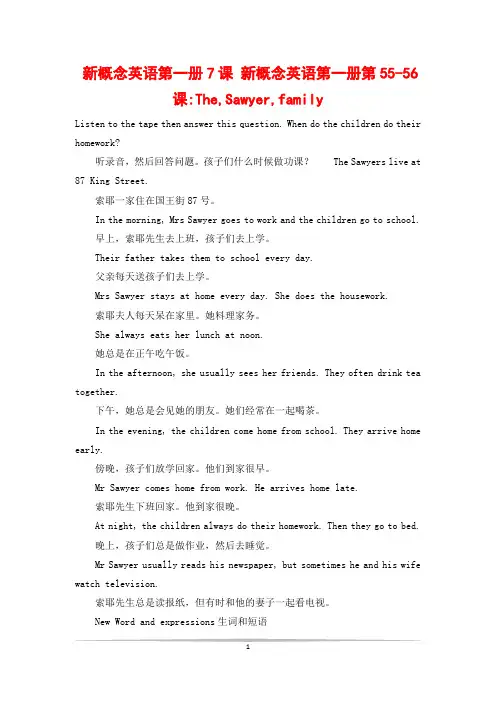
新概念英语第一册7课新概念英语第一册第55-56课:The,Sawyer,familyListen to the tape then answer this question. When do the children do their homework?听录音,然后回答问题。
孩子们什么时候做功课?The Sawyers live at 87 King Street.索耶一家住在国王街87号。
In the morning, Mrs Sawyer goes to work and the children go to school.早上,索耶先生去上班,孩子们去上学。
Their father takes them to school every day.父亲每天送孩子们去上学。
Mrs Sawyer stays at home every day. She does the housework.索耶夫人每天呆在家里。
她料理家务。
She always eats her lunch at noon.她总是在正午吃午饭。
In the afternoon, she usually sees her friends. They often drink tea together.下午,她总是会见她的朋友。
她们经常在一起喝茶。
In the evening, the children come home from school. They arrive home early.傍晚,孩子们放学回家。
他们到家很早。
Mr Sawyer comes home from work. He arrives home late.索耶先生下班回家。
他到家很晚。
At night, the children always do their homework. Then they go to bed.晚上,孩子们总是做作业,然后去睡觉。